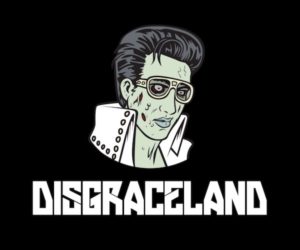Book Feature: Jake Brennan’s “Disgraceland” — A Wicked Exposé of Popular Music’s Psychopaths
By Peg Aloi
Jake Brennan’s unique blend of humor and horror generates very entertaining stories about some of the most shocking crimes committed by various icons of rock, pop, and punk music.

Jake Brennan. Photo: courtesy of the artist.
Boston native Jake Brennan is something of an expert on the bad boys (and girls, I suppose) of popular music. His podcast Disgraceland (a “rock ‘n’ roll true crime podcast”) has been running for several years and his new book, based on his research and musings on the horrifying behavior of various music luminaries, is out October 1 from Grand Central Publishing. Brennan’s unique blend of humor and horror generates very entertaining stories about some of the most shocking crimes committed by various icons of rock, pop, and punk music.
This Monday, Jake will appear at the Coolidge Corner Theatre in a performance and talk with Adam Weiner, aka Low Cut Connie. It starts at 6 p.m. and the $30 ticket price includes a copy of the book, which can be signed at a book signing starting at 7 p.m. across the street, at the Brookline Booksmith (which is sponsoring the event). It’s a somewhat unique presentation and you can find more details here. So look both ways before crossing that busy thoroughfare that joins two of the most vibrant cultural hot spots in the Boston area (boy, do I miss my old stomping grounds).
 I found this book to be fascinating, funny, and often frightening. There are some obvious subjects in the chapters, like Sid Vicious and Phil Spector, both of them linked with the murders of their paramours. But there are very dark stories about other music luminaries, like Elvis Presley. Brennan’s knowledge of his subject matter is evident, smoothly linking together how musicians have influenced each other. In one memorable chapter, the Norwegian Death Metal singer who chose the pseudonym “Dead” is shown to have been heavily influenced by the ostensibly upbeat but actually rather depressing song “Who Do You Love?” by Bo Diddley, who, it turns out, has more than a few skeletons in his closet. “Dead” is an ordinary Norwegian teenager who is driven to rebelling against his rather privileged existence (the curse of a socialist economy, one gathers), and is determined to shock the bourgeoisie with his songs. Brennan makes use of revelatory detail to get inside the teen’s psyche, but also manages to let the reader know that he finds this young man a bit ridiculous — at least before we learn of his nefarious deeds. I learned things about the origin of Norwegian Death Metal I hadn’t been aware of (okay, ya got me, I knew basically nothing about Norwegian Death Metal before I read this).
I found this book to be fascinating, funny, and often frightening. There are some obvious subjects in the chapters, like Sid Vicious and Phil Spector, both of them linked with the murders of their paramours. But there are very dark stories about other music luminaries, like Elvis Presley. Brennan’s knowledge of his subject matter is evident, smoothly linking together how musicians have influenced each other. In one memorable chapter, the Norwegian Death Metal singer who chose the pseudonym “Dead” is shown to have been heavily influenced by the ostensibly upbeat but actually rather depressing song “Who Do You Love?” by Bo Diddley, who, it turns out, has more than a few skeletons in his closet. “Dead” is an ordinary Norwegian teenager who is driven to rebelling against his rather privileged existence (the curse of a socialist economy, one gathers), and is determined to shock the bourgeoisie with his songs. Brennan makes use of revelatory detail to get inside the teen’s psyche, but also manages to let the reader know that he finds this young man a bit ridiculous — at least before we learn of his nefarious deeds. I learned things about the origin of Norwegian Death Metal I hadn’t been aware of (okay, ya got me, I knew basically nothing about Norwegian Death Metal before I read this).
No spoilers from me regarding the myths of murder and mayhem surrounding the subjects in Brennan’s book, but I have to say that it’s pretty engaging to explore this history via the author’s fact-based musings, which must, out of necessity, pay lip service to rumors and legends that have circulated for decades. Brennan does his best to debunk some of the falsehoods and half-truths; Elvis, for example, comes off rather sympathetically once we understand his self-sabotage was partially born of stress and artistic frustration. He was forced to churn out bad B movies in the 1950s to fulfill a grueling contract that didn’t allow him to record any new music. I mean, Roustabout was fun and all, but the King missed out on what might have been fruitful years of making new music.
Brennan’s comprehensive treatment of the world of modern music is based on a sense of infinite interconnections via fandoms, cults of personality, genres spawning other genres, and narcissism begetting more narcissism. This a wonderfully tangled yarn, woven together rather intricately at times. Some of his tropes are a bit odd; he seems to quote biblical passages somewhat arbitrarily. Yes, quotes from the Good Book are related to the matters at hand, but why the Bible rather than Shakespeare or Homer Simpson? Perhaps it is a way to evaluate the moral indiscretions of icons in an industry that, in a rather bacchanalian way, has become a modern “religion.” The transgressions of these sinners inexplicably failed to tarnish their careers because they are revelatory of a spirituality rooted in beatific worship. Fans embrace a liturgy that allows for perpetual forgiveness. Brennan investigates the mythos that celebrates (and protects) some of popular music’s most indelible figureheads — artists who are remembered for their music, but also, perhaps to a greater extent, for their misdeeds.
Peg Aloi is a former film critic for The Boston Phoenix. She taught film studies in Boston for over a decade. She writes regularly for The Orlando Weekly, Crooked Marquee, and Bloody Disgusting. Her blog “The Witching Hour” can be found at at themediawitch.com.
